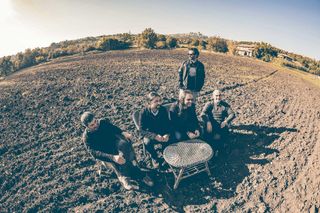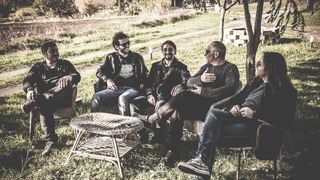“The main reason I write music is because it’s the only way I know to express feelings,” says Giancarlo Erra, singer, songwriter, guitarist, keyboardist and mastermind behind Italian-via-Norwich prog masters Nosound.
The feelings Erra expresses through his band are nothing if not melancholy. Scintilla, the group’s sixth studio album, is a voyage into Erra’s heart of darkness, with tales of sadness, loss and failed love affairs. Yet despite the aching sense of despair in his music, Erra is an artist driven by his passion for music, someone for whom creating is a need, rather than a choice. He has always written confessional lyrics, but Scintilla – which means ‘spark’ in Italian – takes Nosound in a new sonic direction, exchanging the lush, layered arrangements of their earlier albums for a more organic, sparse sound.
“I really think it’s about evolving,” says Erra, who likes to write songs and then put them away until he’s almost forgotten them entirely so he can return with a new perspective. “I have to discover the album as if I was a fan of Nosound,” he says. “It’s just the way I work. There’s an evolution, yes, I think it’s natural. It’s just moving in parallel with my listening tastes. I like to listen to lots of music and I like to discover a lot of new music.
“My listening taste is mostly minimalist or artistic folk, if that means anything. It’s very hard to pin down the kind of music – Northern European dark folk-rock-something. If anything, the new album isn’t that different from the past but it’s going more towards where my listening tastes are going. So something more minimalist, more sensual, and I hope something more direct.
Once a song is finished and it’s about something that was very painful for me, that’s when I really come to terms with it.
“I don’t know if it’s because I’m getting older or what, but I like it when things are simple and direct. There are not many notes, there are not many sounds. Either it’s a good idea at the start, or you just have to scrap it. I really appreciate it when I feel an artist wasn’t there at the computer or with a band rehearsing or playing for hours and then making a song out of copying and pasting. I like it when I can hear that the song was the flash of an idea you have in your head when you’re walking the dog or taking a shower. I was really trying to focus as much as I can on that essential idea I want to get out.”
Another driving force in the changing sound of the group is that Erra is no longer worried about meeting anyone else’s expectations. “Of the previous albums, the album I like the most is A Sense Of Loss, the one that possibly sold less copies than all the others,” he says. “People still complain there were no guitar solos, it’s too slow, it’s too much this or that. I really decided to say, ‘It’s my music and I want to do it exactly the way I want to do it.’

- Nosound - Scintilla album review
- Quiz: The Nice, National Health, Nektar, Nosound...
- Nosound aim high with live album
- Nosound release Sognio E Incendio video
“We’re always in a situation where if someone tells you Nosound is progressive, depending on the progressive audience you have in front of you, some of them might be open-minded but some of them will expect something that’s classic progressive and we don’t do that and we never did. I’m 38 now and I really don’t care what people think about the music and if they are happy or not. I just really wanted to do an album that’s 100 per cent what I wanted it to be. Someone will be upset, someone will be happy, I honestly don’t care.”
While Scintilla isn’t a concept album in the traditional sense, there is a theme behind the songs, of taking old memories and past events – which Erra likens to dead branches and kindling – and setting them aflame. “We always tend to preserve ourselves from pain or negative feelings, while this is just what we need for the spark to actually start a new fire,” he says. “For what I was going through in my personal life, I just discovered that instead of running away from the painful things, I actually had to face them, even to save them, to set them aside, to create the conditions for a new spark. That is the concept behind the album. It’s not always very clear in all the songs, but it is always there. You first need to go through pain to make it art.”
For Erra, the creative process becomes one of catharsis. “Once a song is finished and it’s about something that was very painful for me, that’s when I really come to terms with it,” he says. “That’s possibly the most direct and simplest explanation. Music is what allows me to come to terms with things that trouble me.
“When we play live it goes to extremes. It’s extremely joyful because, despite what most people think, I really love to be on stage, much more than to be in the studio. So that’s a joyful part of it because you’re with the band, you’re interacting with the audience and you’re playing your music so there’s nothing not to like about it.”
However, he admits that there can be tracks in the live set that feel like touching a raw nerve. “All of the songs are personal but obviously some of them may talk about something that still stings or worries me, or that was so powerful that even just singing about it brings me back to the conditions where I wrote it, or brings me back to how I was feeling when I was living that situation. It’s happened to me sometimes on stage that my voice was breaking up because I was so into what I was singing. So it can be very joyful but sometimes it really can give me pain when I’m on stage.”
Erra describes the live presentation as “a blank piece of paper that you are writing on. I think it’s dangerous because once you allow yourself to have backing tracks on stage, you lose what’s happening in the moment. Sigur Rós are doing a new tour and it’s very cinematic music. Before they were going around with 15 elements between the band and brass and strings, so it was a massive sound done by real people on stage. Now it’s just the three of them. The sounds are all there, but if you’re at the gig, you’re missing something. There’s no push, there’s no punch.”
We always want a life where we have less problems or less worries, and then I always think, ‘Hmm, then would I still be able to write music?’
While Scintilla expresses Nosound’s ongoing development, Erra has no worries about performing the new material alongside older tracks when it’s time to tour. “The album we did before this one was a live album, Teide 2390, and I think this whole process of having a more minimalistic approach started with the live album,” he says. “I don’t like to use programmed sequences or instruments that we’re not playing. I really want everyone to play live music because I like it that way.
“When we play live, we’re already making the old songs sound more like the new songs in terms of arrangements. The new songs are easier because there are never more than two or three instruments – for example, on the keyboards or on the guitar – so almost all of what’s on the album we can play just with our hands, without computers. I don’t see a big difference with the new material between the album version and the live version, but probably the old material will be adapted to sound more direct and more minimalistic.”
Given how much Nosound’s music explores the darker corners of Erra’s mind, what would happen if he ever became thoroughly content? “That’s something I’m always scared about,” he says. “We always want a life where we have less problems or less worries, and I always think, ‘Hmm, then would I still be able to write music?’ I don’t have an answer to that.
“I think that if you really live life, there’s always going to be something that’s not right or could be better, so it’s important to keep listening, always being aware of what’s happening around me and if something is troubling me, possibly writing a song about it rather than walking away from it. In that case it’s a win-win situation – I get a new song and I also come to terms with something instead of running away from it. If at some point I write a very happy album, everyone will know that my life changed!”
Scintilla is out now on Kscope. See Nosound’s website for more information.


